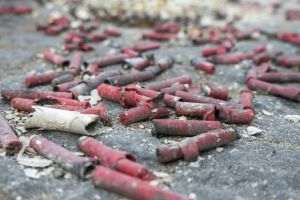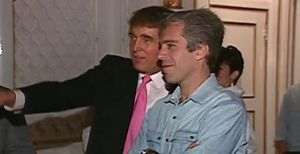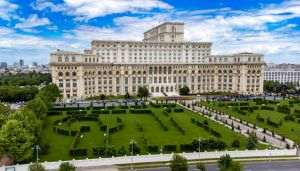The statement of the French President Emmanuel Macron regarding the possibility of sending troops to Ukraine caught the officials in Bucharest off guard, even if at the Monday evening meeting at the Elysee Palace, in which President Klaus Iohannis also participated, no decision in this sense, through the lens of the lack of consensus.
Sources from the Ministry of National Defense told the Bursa newspaper that so far representatives of the Ministry of Defense and the Defense General Staff have not been contacted by their counterparts in NATO or Europe regarding such a proposal and that such a proposal has not been discussed at the meeting of the chiefs of staff of the NATO member countries that took place in mid-January, nor at the meeting of defense ministers from the allied states that took place on February 15 in Brussels.
The fact that the authorities in Bucharest were not prepared for the idea launched by the French president also emerges from the statement posted yesterday on the website of the Presidential Administration regarding the participation of President Klaus Iohannis in the event in Paris, a document in which nothing is mentioned about the discussion on sending troops to Ukraine. The only passage in the press release that would give a vague hint that this topic was also discussed is the following:
"Equally, the leaders reconfirmed the need to continue military support both on a European and bilateral level, with the options for intensifying the assistance given to Ukraine being discussed. During the meeting, the implications of the war on European and Euro-Atlantic security were also discussed, with an emphasis on the implementation of the decisions taken at the NATO Summit in Vilnius. The unanimous conclusion of the participants at the high-level meeting in Paris was that there is a need to intensify all efforts to continue the multidimensional support given to Ukraine".
Otherwise, total silence from President Iohannis, Prime Minister Ciolacu, the Minister of Defense - Angel Tîlvăr and the President of the Senate, Nicolae Ciucă, which shows that the authorities in Bucharest, even if they did not expect such a statement, do not take into account for the time being sending troops to the neighboring country, content to increase the number of 15 military support packages consisting of equipment and ammunition given to Ukraine so far, according to the authorities in Kiev.
• Nicu Fălcoi: "I don't think that Romania should send troops to Ukraine at this moment"

Regarding the statements of the French President Emmanuel Macron, deputy Nicu Fălcoi (USR), vice-president of the NATO Parliamentary Assembly, told the BURSA newspaper that he does not believe that our country will send troops to Ukraine.
Nicu Fălcoi said: "I was surprised by President Macron's statement; I did not expect such a thing. It is a completely new idea, because the possibility of European Union or NATO countries sending troops to Ukraine has never been discussed, but I think it will be the decision of each individual state. In no way will it be a NATO decision, because NATO will not get involved in such a thing. I do not think that Romania should send troops to Ukraine at this time. The fact that there are still Romanian citizens who want to participate in those fights is their personal business and in no case a decision of the Romanian state. I don't know what was the motivation behind this statement made by President Macron, but lately I have noticed that several European officials have come out with statements to wake up the citizens to reality. Maybe Emmanuel Macron's statement was made in the same spirit, in the sense that for too long we thought that nothing could happen to Europe, and here we are in a situation where it is possible that something bad could happen to Europe. There are several officials who have recently made statements that have made citizens ask questions. That is why I think that this statement by Macron is in the same sense, but it is also possible that it is a test of Russia to see how the Kremlin authorities react to such a statement".
The Vice-President of the NATO Parliamentary Assembly stated that, in case it is decided to send troops to Ukraine in the future, the decision will belong to each EU or NATO member state.
Mr. Falcoi specified: "When a state decides to send troops there, this measure implies involvement in war. But I tell you that it will not be a NATO decision, because the Alliance will not involve itself in this war unless one of the member states would attack. In Ukraine, the question is not the number of soldiers, but rather the weaponry and ammunition it needs. Ukraine has military reserves from its own citizens, but at the moment it is in desperate need of ammunition, of ranged weapons long range and the most efficient weaponry to face Russia's attacks. I think that is very important at the moment and less so is sending troops. I think that at this moment the countries that have the possibility to provide such long-range missiles (ed. - German Chancellor Olaf Scholz refused to send Taurus missiles to the Kiev authorities) should do so, because without them it will be a bit difficult for Ukraine, and Ukrainians are not only fighting for their country: they are also fighting for Europe, for a lifestyle that we consider normal".
• Aurel Cazacu: "Sending troops from European states to Ukraine would mean moving into a new stage of the war"

On the other hand, the military expert Aurel Cazacu believes that our country is not part of the group of European states that could send troops to Ukraine and that we are not prepared even for defense, for the use of the weaponry that we purchased from the allies.
Aurel Cazacu stated: "You can give support in weapons and money, but if you have already sent troops, it would mean for the Kremlin authorities that it is a foreign interference and then they can move to the next phase of the war. In my opinion, the Russian Federation will not attack other European states in the coming years, but it will create a state of tension in relations with Europe, which is not beneficial for the EU, from the point of view of energy and supply chain issues. The Russians, through what Putin is doing, who with the help of the church is bringing people from beyond the Ural mountains into the armed forces, are strengthening their position in Ukraine, unlike the authorities in Kiev who no longer have anywhere to concentrate soldiers, because many young and adults have left that country in the last two years. And that is a problem, in addition to the fact that there is not the necessary ammunition, because measures were not taken in time. Even in our country no measures are taken, although the third year of the war has entered. The authorities in Bucharest do not start the production of powder necessary for the production of ammunition. For nothing, the Americans give us planes, tanks, ships, firing systems, artillery, if we don't have the necessary ammunition. We learn to fly the F16 for nothing if we don't even have ammunition for training. (...) Romania is not part of the group of European states that want to send troops to Ukraine, because we are at the interface of this and because we have a big deficit of troops, of soldiers at the moment".
In these conditions described above, Mr. Cazacu believes that we are facing a high risk if the forces of the Russian Federation reach the mouths of the Danube and the Chilia branch.
The military expert stated: "It is not good at all. Consider a possible scenario in which Putin conquers Odessa, reaches the mouth of the Danube, then goes to Transnistria and turns the Republic of Moldova into Ossetia or Belarus. We will have a direct border with Russia, which does not love us, nor NATO. And it will lead to a diplomatic cold snap that can be costly and unpleasant. Anything is possible at this point."
Regarding the statements of French President Emmanuel Macron, Aurel Cazacu believes that it is also a psychological game: "In war, as in every battle, psychological actions are taken to test the enemy. Maybe no troops will be sent to Ukraine, but they want to see now what is the reaction of Putin, the reaction of the Kremlin, because the troops will not arrive immediately, but after a long period. But the current mention of this possibility by Emmanuel Macron may be aimed at observing the reaction of the Russian Federation, because, in my opinion, after Putin is re-elected as president, based on the war economy, he will do whatever he wants for the next 10 years, especially since Russia's export has been moved to a market of 3 billion people, as many as China and India together."
• Emmanuel Macron: "We are not waiting for the outcome of the US presidential elections to make decisions, because the future of Europe is at stake"
We remind you that on Monday evening, at the end of the meeting with the leaders of 20 European states, during a press conference, French President Emmanuel Macron stated that, depending on the dynamics of things, the European states could send troops to Ukraine, but that it was not taken another decision in this regard.
Emmanuel Macron said: "There was no consensus to send troops to the ground, but depending on the dynamics of things, nothing can be excluded. We will do everything necessary to prevent Russia from winning this war. I say this in light of the collective unity we have demonstrated over the past few years. (...) I think that no European country can say that Russia's current attitude and the war in Ukraine have not had an impact on it. And I think that (...) we are talking about a geopolitical shock that justifies taking exceptional measures. (...) I did not say that France is not favorable to the idea of sending troops to Ukraine, and I do taking into account the fact that no decision has been made and no consensus has been reached, I do not want to state which European states have brought up this idea. But France's position is this: nothing can be ruled out for Russia not to win this war."
The French president said that European leaders will make decisions about supporting Ukraine without waiting to see who will become president in the US following elections this year.
Emmanuel Macron stated: "If we, as sovereign states, consider that this war in Ukraine will determine our future - which I firmly believe, because in Ukraine our European security is at stake -, we must delegate to the American electorate what will happen to our future? I think not, no matter what the American vote will be in this year's presidential election. So we will not wait for the result of those elections and that was the objective of our meeting to make decisions now because our future, of Europe is at stake. That is why the Europeans must decide on the situation in Ukraine. It will be very good if the Americans join us, it would be a plus, but we must be prepared to act even without this support. It is not about lack of confidence, nor pessimism, nor fear; we do it because it is what depends on us and what we have to do."
Ahead of the meeting of the 21 heads of state or government, Robert Fico, the prime minister of Slovakia, said: "I will limit myself to saying that these theses (in preparation for the Paris meeting) suggest that a number of NATO and EU member states are considering that they will send troops to Ukraine based on bilateral security agreements they concluded with the authorities in Kiev. I cannot say for what purpose or what these troops should do there.' He stated that his country will not send soldiers to Ukraine.
Asked about Fico's remark, Czech Prime Minister Petr Fiala said that "The Czech Republic is certainly not preparing to send any soldiers to Ukraine; no one needs to worry about that."
However, the fact that President Emmanuel Macron does not exclude this measure in the future, depending on the dynamics of things, shows that the respective idea once launched in the European public space will take shape, as happened with the sending of Himars and Patriot systems, by Leopard tanks, Caesar howitzers and F16 jets, measures that were also launched in the public space, and then materialized into reality.
What the European leaders do not take into account is that sending troops to Ukraine would be tantamount to the Kremlin authorities involving the respective states in the war on the side of Ukraine, and thus Vladimir Putin and his cronies would have the necessary reasons to target Russian targets with missiles from the territories of the European NATO member states, the so-called command centers to which Foreign Minister Sergey Lavrov and Dmitry Medvedev, the vice-president of the Russian Security Council, have often referred.
• Dmitry Peskov: "Sending European troops to Ukraine means a military conflict between Russia and NATO"
Sending European troops to Ukraine means a military conflict between Russia and NATO, Kremlin spokesman Dmitry Peskov said, quoted by the Russian publication Kommersant, referring to French President Emmanuel Macron's statements.
Dmitri Peskov stated, according to the cited source: "The idea of sending a contingent to Ukraine is a new, important element, because we know all the other measures. Western leaders have a wide range of views on the new idea, even if there is no consensus on the subject. Many maintain a sober assessment and understand the risks. That measure is not in the interest of third countries, which must be aware of this. If the EU and NATO will send troops to Ukraine, we should talk not about the probability, but about the inevitability of a military conflict between Russia and NATO".
Earlier, Security Council Vice President Dmitry Medvedev said in a social media post that a possible military conflict between Russia and NATO would be an apocalypse and "the end of everything," according to Russian publication Kommersant. According to Medvedev, due to the incomparability of military potentials, Russia will have to give an asymmetric response. "In order to protect the territorial integrity of our country, ballistic and cruise missiles with special warheads will be used," noted Dmitry Medvedev.


























































